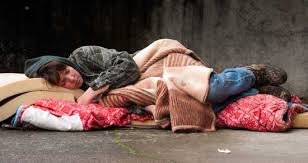Maybe next year or the year after, Americans will decide to take a few dollars away from the military or the oil companies or agribusiness in order to fund significant change in affordable housing, mental health services, drug treatment programs, early education, and other factors contributing to homelessness. Until we so decide, will we at least feed each other, shelter each other? Will we care for each other?
An example: as a result of very hard work, remarkable generosity and unconditional compassion, an emergency winter shelter for County residents in Ukiah opened in November. This effort was spearheaded by some members of the Mendocino County Homeless Continuum o f Care, who formed with other advocates for the homeless an independent ad-hoc committee to find, fund and furnish a winter shelter.
The homeless and those who work on their behalf may be alone in fearing the predicted wet winter. Most people can endure winters as cold as the ones we get here in Mendocino County. For those who have no shelter, maintaining health and well-being when they are cold and wet is a far greater challenge. Under those conditions, illness is inevitable, and emergency room visits will increase. And obviously, the mortality rate will rise correspondingly. According to the National Health Care for the Homeless Council, homeless persons are three times more likely to die than the general population.
We know that several decades ago, shifts in our economy and culture created wide-spread homelessness. As a society we allowed those changes to take place without fully reckoning the cost. Reversing those changes in the current social and political climate seems more like a vertical climb than an uphill battle. Nonetheless, there are admirable efforts to alter the conditions that force individuals and families onto the streets.
Programs that are therapeutic (Unity Village here in Ukiah is one) obtain funding from public and private sources. We are willing to give generously to reduce the numbers of the homeless. Some of us are less willing to support palliative efforts, ones that do not directly work to change lives or laws or social structures. Giving money to the Ukiah Food Bank doesn’t make the problem go away, which is the argument for devoting resources to Unity Village rather than the Emergency Winter Shelter. Unity Village is commendable, innovative and committed to change – the Winter Shelter is, on the surface at least, only commendable. (But consider this: a person who has had a good night’s sleep may more easily find the will to change.)
The fallacy is that we have to choose one approach or the other. Morally we have to support both, and they don’t conflict. We hear the argument that soup kitchens and shelters are enabling. It’s plausible but totally irrelevant. This is what matters: during a cold, wet winter, have we done what we can to shelter people in our County?
It is more tragic than ironic that we spend far more to sustain people as homeless than it would cost to house them, as has been demonstrated again and again. Ask any cop, ask any emergency room worker, ask even public works employees. Ask any corrections officer how many prison inmates are incarcerated because their homelessness has led them to commit crimes. How much human potential is wasted? Ask any teacher about the impact of being homeless on children’s capacity for learning and success in school. Look at statistics looking at the relationship between childhood homelessness and adult mental illness, as well as incarceration and addiction. According to a paper published by the American Psychological Association, homeless youth “are often more likely to grapple with mental health (depression, anxiety and PTSD) and substance abuse problems.” Numerous other studies lead to the same troubling conclusion.
Government in a democracy, be it local, state or federal, is all too often penny-wise and pound-foolish. So often a stitch in time saves nine – it’s true for road maintenance, health care, early childhood education, and homelessness. We can blame it on the government, but it is, after all, our government. Do we have the political will to change this? Can we live with the status quo?
###
Benj Thomas, a retired teacher, serves on the Mendocino County Homeless Continuum of Care. He was a member of the Ukiah City Council from 2006 to 2014.


